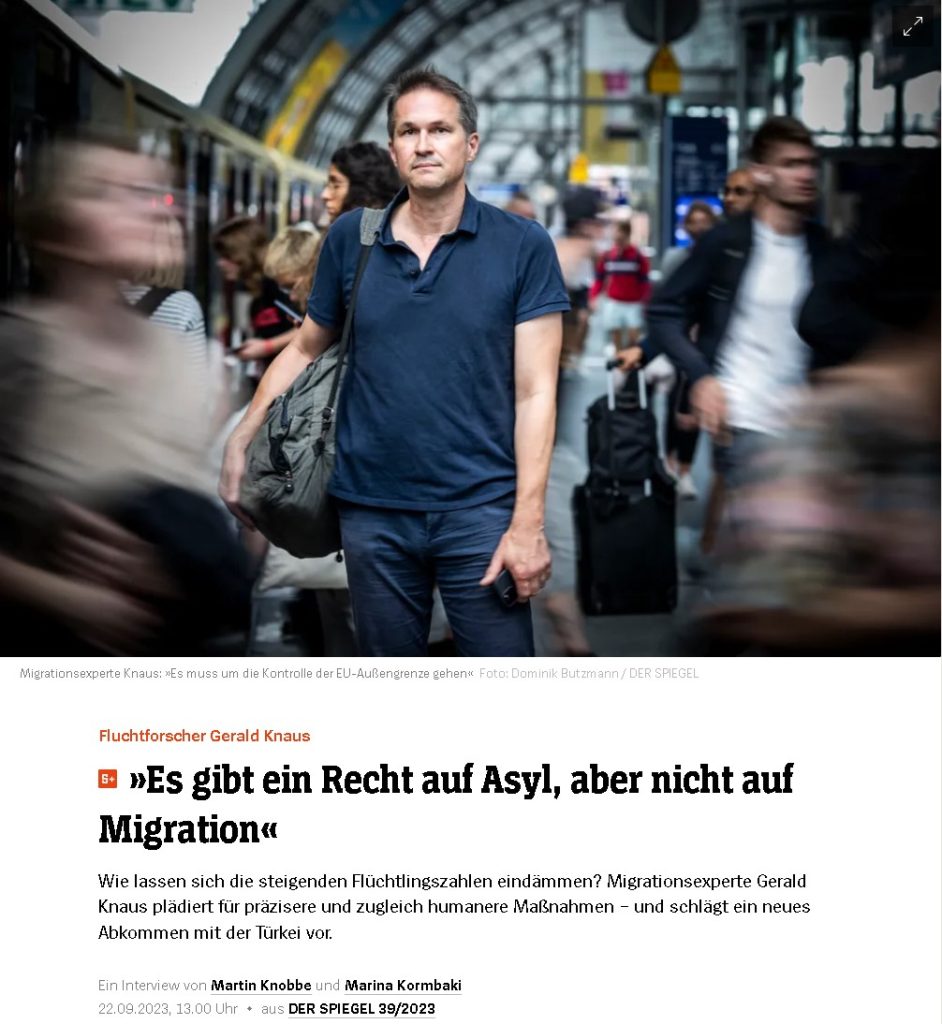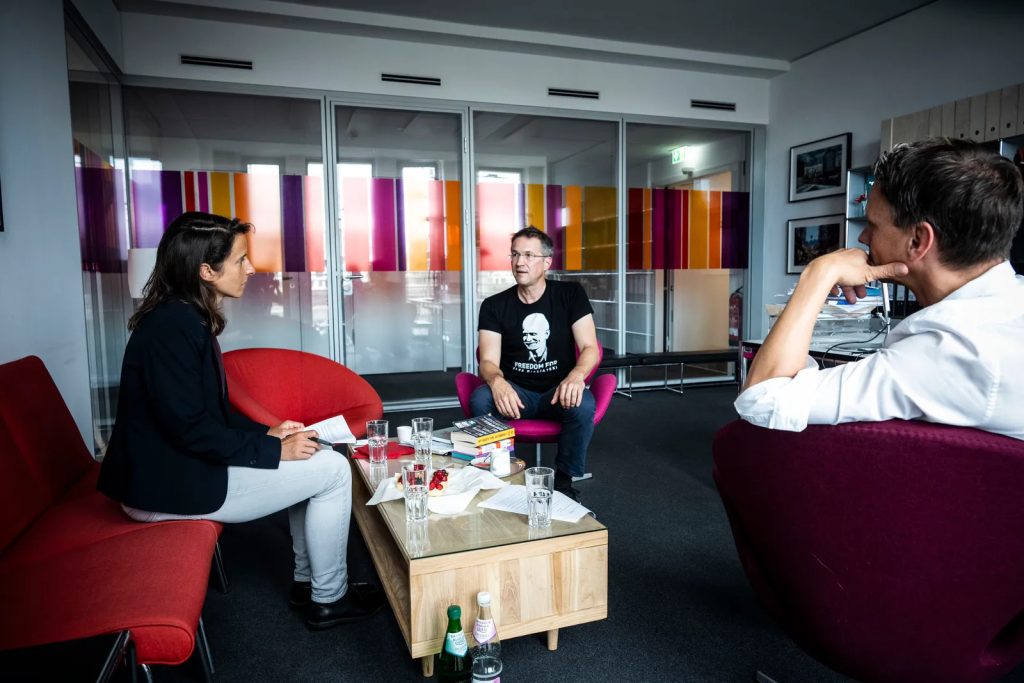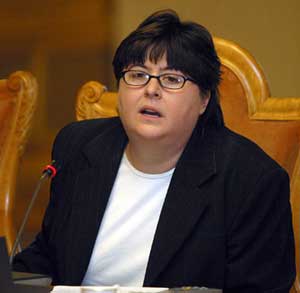
This interview was first published in German by Der Spiegel on 22 September 2023:
»Es gibt ein Recht auf Asyl, aber nicht auf Migration«
How can the rising numbers of refugees be contained? Migration expert Gerald Knaus pleads for more precise and at the same time more humane measures – and proposes a new agreement with Turkey.
SPIEGEL: Europe is once again looking to Lampedusa, where boat after boat of refugees is arriving. How can Germany help?
Knaus: European policy has learned nothing. Today, more, not fewer people are coming and dying in the Mediterranean than in recent years. Berlin should work for a policy change.
SPIEGEL: Italy’s Prime Minister Giorgia Meloni wants a sea blockade that does not let any refugee ships through, is that what you mean?
Knaus: There was already such a blockade once, in 2009, when the Italian navy brought asylum seekers to Libya. European courts clearly condemned it. To do it again would be an attack on the European Convention on Human Rights.
SPIEGEL: In Germany, there is a growing demand for better surveillance of its own borders.
Knaus: France has been doing this since 2015, and in the four years since, the number of asylum applications has doubled. Austria has also been doing this for years. In 2022, there were 110,000 asylum applications there – more than in 2015. Those who are turned away at the German-Swiss border try it so many times until it works.
SPIEGEL: Will only a wall help then? Some people would probably like that.
Knaus: Then go to Lörrach in Baden-Württemberg, where the wall would run right through the vineyards. And even then: Would they check every car, every commuter? The pragmatic Swiss have calculated how much such controls would cost the economy. No, it has to be about controlling the EU’s external border.
SPIEGEL: In June, Interior Minister Nancy Faeser described the planned tightening of European asylum legislation as “historic”. Among other things, there are to be mandatory asylum procedures at the EU’s external borders for people from countries with low protection quotas. Did you also see reason to rejoice?
Knaus: Greece already has border procedures at its external borders. Italy doesn’t do them because they would be useless. This proposal is neither a taboo nor a breakthrough.
SPIEGEL: But the commitment is new.
Knaus: This year, about 25,000 people have already arrived in Italy from the Ivory Coast and Guinea. Last year there were three deportations from Italy. First of all, we need agreements with countries for rapid readmission after cut-off dates, which are in the interest of these countries. Border procedures without agreements are pointless.
SPIEGEL: Do such political decisions frustrate you?
Knaus: As a citizen, yes. The policies in this area often seem frivolous. At the external borders, the rule of law is at stake, and thousands are dying. And the coalition agreement of the “traffic light” government even describes a convincing strategy of what should be done.
SPIEGEL: What is so special about it?
Knaus: The government promises to reduce irregular migration without illegal refoulement or pushbacks. This can only be done through a dual approach of sea rescue and a policy that prevents people from getting on boats without violence. It is high time to do that.
SPIEGEL: What is at stake?
Knaus: Liberal Democracy. On 2 September 2015, Alan Kurdi, the two-year-old boy from Syria, washed up dead in the Mediterranean. Two days later, Hungarian Prime Minister Viktor Orbán predicted that in view of the hundreds of thousands who came to the EU via the Aegean Sea at that time, Europe’s governments would soon realise that this could only be stopped by abandoning human rights. He celebrated the imminent end of liberal democracy in Europe and propagated the conspiracy theory of the “Great Population Exchange”. Immediately after Orbán’s speech, my Institute proposed the EU-Turkey Statement. Refugees should be admitted legally, irregular migration should be reduced through lawful repatriation. The point was to combine the empathy that existed and still exists with control.
SPIEGEL: Has empathy been lost?
Knaus: Today there is illegal violence at most of the EU’s external borders. EU law is ignored. The EU-Turkey statement collapsed in March 2020, since then there have been no repatriations, and instead, pushbacks. In Libya, Europe has been cooperating with militias that abuse migrants since 2017. And right-wing extremists are gaining ground.
SPIEGEL: Then let’s get specific: How does Germany create more control and still grant protection to those who need it?
Knaus: What is needed now is a renewed EU-Turkey statement. Athens is currently appealing to Berlin to make Turkey a new offer. Greece would also legally accept tens of thousands of refugees from Turkey if it took back those arriving irregularly. The agreement in March 2016 immediately reduced the numbers of arrivals…
SPIEGEL: …from one million the year before to 26,000 the year after.
Knaus: At the time, Turkey offered to take back anyone arriving after the deadline. The EU’s billions for social assistance, education and medicine for millions of Syrians also had an effect. What was missing was a mechanism to check in Turkey that those who were sent back would be treated there in accordance with the Human Rights Convention, plus a credible asylum system. The UNHCR should now be involved in this.
SPIEGEL: The German government does not seem to have the best connection to Ankara.
Knaus: Turkey hosts the most refugees in the world, 3.5 million. If the EU would agree to continue to co-finance their support in Turkey and to take in people legally to do so, Ankara could help reduce irregular migration, as it did in 2016.

SPIEGEL: Greece is pressing for a solution because the number of refugees in the Aegean is rising sharply.
Knaus: Yes. The numbers have been going up since people stopped being pushed back by force at sea.
SPIEGEL: Which could be used as an argument by those who say: More toughness at the borders leads to fewer refugees.
Knaus: No democrat can support the systematic breaking of the law. And even in 2022, more than 380 migrants died in the Aegean.
SPIEGEL: Many will say that Turkey is not a state with which one should cooperate.
Knaus: It depends on what you cooperate on. Keyword visa liberalisation: For that, Turkey would have to implement rulings of the European Court of Human Rights. And quickly take back Turks who are obliged to leave the EU.
SPIEGEL: Is the Turkey statement enough to defuse the situation?
Knaus: No. Further agreements are needed, especially for the central Mediterranean, also with safe third countries.
SPIEGEL: One idea is to send people there who have applied for asylum until their procedure is completed.
Knaus: According to the Danish proposal not only would procedures take place there, but people would also find protection after a successful procedure. A counterargument is then that there is not a single safe state for refugees in Africa today. And that one must accept that there are a few European states that are safe for refugees and the rest of the world remains unsafe. But it must be about giving countries incentives to want to become safe.
SPIEGEL: How realistic is it that we bring Syrians to Africa, where they then wait for their asylum decision?
Knaus: There is a very important ruling on this from the Court of Appeal in London. The UK government was planning to bring asylum seekers coming across the English Channel to Rwanda. Hotels have already been rented there. The court ruled that this arrangement would be in line with the European Convention on Human Rights as long as humane conditions and a fair asylum procedure were provided there. It then declared that the latter was not yet the case in Rwanda. But it pointed the way for legal third-country solutions. It is not possible without fair asylum procedures.
SPIEGEL: Is it ethical to bring a refugee to Rwanda without any connection to that country?
Knaus: There is a right to asylum, but not to migration. The United Nations Refugee Agency (UNHCR) has often stated this. Since 2019, it has been bringing people from Libya to Rwanda and doing the asylum procedures there. For that, Rwanda is already safe. A humane system would be one with more sea rescue and the goal of “zero deaths”, without repatriations to Libya, asylum procedures in truly safe third countries and the expansion of legal admission.
SPIEGEL: “No right to migration”: You sound like a CSU politician.
Knaus: Or like a Canadian liberal. “We will reduce irregular migration and make regular migration possible,” says the German coalition agreement and announces the that government will examine whether asylum procedures are possible in third countries. The practical question is: When are countries of origin and third countries willing to cooperate with us? Only if we also expand the possibilities for legal mobility. For example, offering a country like Morocco the prospect that its inhabitants can travel to Europe visa-free if they cooperate. Countries with a visa-free regime cooperate on readmission, because otherwise the popular visa-free regime is at stake. In addition, more exchange with Africa is a value in itself.
SPIEGEL: Do you have other states in mind as models for a wise asylum policy?
Knaus: Those who come to Canada irregularly are sent back to the safe third country, the USA. Canada accepts half a million immigrants annually, including 50,000 refugees. In Germany’s case, that would be more than 100,000 refugees – that’s how many Germany granted protection status to each year. The difference: Families who come to Canada do not risk their lives, are not raped on the way. They get on the plane and are ready for integration from day one.
SPIEGEL: Many worry that Germany is letting too many migrants into the country. At the same time, we complain that we don’t have enough migration to cover our labour shortage. How do you explain this contradiction?
Knaus: Many people fear loss of control. In Australia’s immigrant society, a few thousand boat people became a national obsession. Add dramatic stories of millions of unknown people supposedly ready to emigrate, and worry turns to fear. One problem with this is irresponsible talk about the hundreds of millions of climate refugees who would soon be arriving. The often-quoted UNHCR figure of the alleged hundred million displaced is also misleading.
SPIEGEL: Why?
Knaus: Because it counts many millions who fled decades ago. Because the majority of them have never crossed a border. Because the vast majority who have to leave their homes because of climate change will stay in their countries or regions.
SPIEGEL: Are many against migration altogether because of such scenarios?
Knaus: I am against a discourse that stirs up irrational fears. People are capable of cruelty as well as great empathy. Take Switzerland. During the Second World War, it had an anti-Semitic head of the foreigners’ police who took pride in preventing almost all Jews from the “Third Reich” from finding refuge in Switzerland. A few decades later, Switzerland participated in the voluntary admission of Vietnamese boat refugees. Large families who did not speak a word of German were kindly received in villages in Aargau. The Swiss were not afraid and believed they understood why these people fled from evil communism.
SPIEGEL: And the moral of the story?
Knaus: Fear and prejudice destroy empathy. Racists exploit this. To maintain empathy, majorities need to feel that there is control and understand why people flee. For politics, humane control is therefore the way to counter the narratives of right-wing extremists.

 Alina Mungiu-Pippidi, one of Romania’s leading social scientists and founder of the Romanian Academic Society has moved to teach at the Hertie School of Governance (HSoG) in Berlin where she invites me to give a presentation on Turkey’s potential for accession to the EU. Social and economic developments, the recent (legal) revolution of women’s rights, the German debate about Turkey and the role of the military were some of many areas I tried to cover.
Alina Mungiu-Pippidi, one of Romania’s leading social scientists and founder of the Romanian Academic Society has moved to teach at the Hertie School of Governance (HSoG) in Berlin where she invites me to give a presentation on Turkey’s potential for accession to the EU. Social and economic developments, the recent (legal) revolution of women’s rights, the German debate about Turkey and the role of the military were some of many areas I tried to cover.


